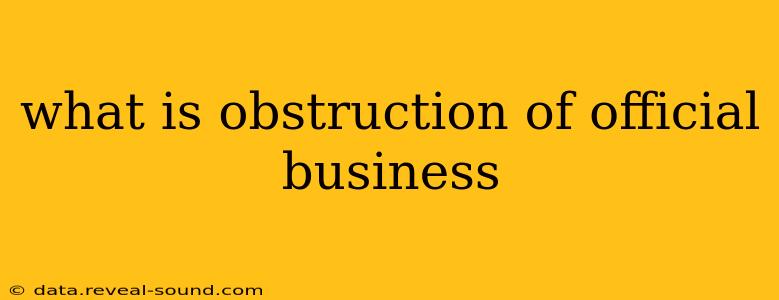Obstruction of official business, sometimes called interfering with a public official, is a crime that involves hindering or impeding a government employee or agent while they're performing their official duties. This isn't just about physically stopping someone; it encompasses a wide range of actions designed to frustrate or prevent the lawful execution of their job. The specifics of the crime, including potential penalties, vary significantly depending on the jurisdiction (state or federal level) and the specific circumstances of the offense.
What Constitutes Obstruction of Official Business?
The key element is the intent to interfere with the performance of official duties. This intent can be proven through direct actions or circumstantial evidence. Examples of actions that could constitute obstruction include:
-
Physical Interference: This is the most straightforward type. Physically assaulting, restraining, or blocking a police officer, a tax auditor, or any other government official while they're working is a clear violation.
-
Verbal Harassment or Intimidation: Aggressively confronting, threatening, or using abusive language towards an official to discourage them from performing their duties can be considered obstruction.
-
Providing False Information: Intentionally lying to or misleading a government official during an investigation or official proceeding falls under this category. This includes providing false documents or withholding relevant information.
-
Destruction or Concealment of Evidence: Tampering with or hiding evidence that's relevant to an official investigation is a serious form of obstruction.
-
Resisting Arrest: Actively resisting arrest, even without physical violence, is often considered obstruction of justice or a related charge.
-
Filing Frivolous Lawsuits or Complaints: While the right to file lawsuits is protected, filing numerous frivolous lawsuits solely to harass or impede a public official's work can be considered obstruction.
What are the Penalties for Obstruction of Official Business?
Penalties for obstruction of official business vary greatly depending on several factors, including:
- The jurisdiction: State laws differ significantly from federal laws.
- The severity of the offense: Minor infractions might result in fines, while more serious cases could lead to imprisonment.
- The offender's prior criminal record: A prior record usually results in harsher penalties.
- The specific intent of the offender: Intentionally obstructing a process carries heavier weight than accidental interference.
Penalties can range from relatively small fines to lengthy prison sentences, especially in cases involving violence, threats, or significant disruption of government operations.
How is Obstruction of Official Business Different from Other Crimes?
It's crucial to understand how obstruction of official business differs from similar offenses. While it often overlaps with other crimes like resisting arrest, contempt of court, or perjury, it focuses specifically on the interference with a public official's duties. For example, resisting arrest is focused on the act of resisting apprehension, whereas obstruction of official business might encompass actions taken before the arrest, such as preventing an officer from conducting an investigation.
What if I Accidentally Interfere with Official Business?
Accidental interference is generally not considered a crime. The key element, as repeatedly emphasized, is the intent to obstruct. If an unintentional act leads to interference, it's less likely to result in criminal charges. However, it's always best to cooperate with officials and avoid any actions that could be misinterpreted.
Can a Private Citizen Be Charged with Obstruction of Official Business?
Yes, absolutely. The crime is not limited to interactions with law enforcement. Any government employee or agent performing their official duties can be the target of obstruction. This could include interactions with tax officials, building inspectors, health inspectors, or other regulatory agencies.
This information is for educational purposes only and should not be considered legal advice. If you have questions about a specific legal situation, consult with a qualified attorney.
